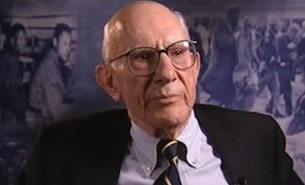(Editor’s Note: A legendary journalist died in Conyers, Ga., recently. Here is one reflection on his life work. On a personal note, the deceased represented the AP Managing Editor’s Association on the Accrediting Commission for Education in Journalism and Mass Communications for years, during much of 15 years when I was the Southern Newspaper Publishers Association representative on the same commission. We shared cab rides to airports often, after losing battles in the Commission, often by lop-sided votes, with us in agreement.—eeb)
By Edward VanHorn
Executive director, Southern Newspaper Publishers Association
ATLANTA, Ga., March 24, 2015 — Long before Woodward and Bernstein inspired a generation of Baby Boomers to become journalists, Claude Sitton was setting the gold standard for journalism.
Sitton covered the civil rights movement for The New York Times from 1958 to 1964 and served as national editor of The Times until 1968. He died in Atlanta on March 10. He was 89.
Sitton left The Times in 1968, shortly after the assassination of Martin Luther King Jr., to become editor of The News & Observer in Raleigh, N.C. — a job he held until he retired in 1990.
Dennis Hevesi, writing in The New York Times, called Sitton “an eyewitness to one of the most wrenching but consequential episodes in American history.”
Jay Price, at The News & Observer, wrote: “Sitton’s direct, evocative and sometimes harrowing stories were a pipeline of truth from the front lines of the civil rights movement to the kitchen tables and living rooms of the rest of the nation.”
Sitton’s commentary at The News & Observer won a Pulitzer Prize in 1983, and his journalistic achievements were recognized with a George Polk Career Award in 1991 and John Chancellor Award in 2000.
The News & Observer describes Sitton as a “forceful editor” whose tenure was “marked by his aggressive direction of reporting and his determination to hold accountable those he thought were not acting in the public good.”
That may be an understatement. He was often relentless.
He pushed journalists to interpret change: “Mere reporting of isolated events is not enough.”
He was unapologetic about his strong positions: “Popularity is not a legitimate goal of a newspaper.”
And he was a strong advocate for public education reform, and education standards for journalists.
In a 1984 speech to newspaper executives at the University of Georgia, Sitton said: “Many of the reporters, editors and publishers who will replace us are still in school. The evidence indicates strongly that they are not receiving the preparation they must have if they’re to do our jobs and do them well. If that is so, the future of newspapers as the only accurate, comprehensive and thoughtfully informative journal of daily events is in jeopardy.”
Sitton voiced concern that future journalists would lack the skills to gather information with perception and put it in perspective for readers.
“As you know only too well,” he said, “that is television’s game, not ours.”
While he was in Raleigh, Sitton led dozens of SNPA Foundation programs for writers and editors, and campaigned with SNPA to fortify journalism school accreditation standards that required students to have firm foundations of knowledge in liberal arts, sciences and social sciences – as well as skills in writing and editing and technology.
From 1991-1994, Sitton taught journalism at his alma mater, Emory University. Suzanne Morrissey, his student at Emory and now the editor of the alumni magazine at the College of the Holy Cross in Massachusetts, called Sutton “a journalism god.”
“You knew it was a privilege to be learning from him. It was a gift to be in his presence,” Morrissey said.
“When someone who had that much influence on you passes, it really brings back to mind the reason you went into this business in the first place and how much they inspired you.”
The journalism profession needs many more torch bearers like Claude Sitton – but in so many ways, he was a singular force.
- View a 2002 Newseum interview with Sitton, talking about Freedom Summer in 1964 and the lies and cover-up involving the murders of three civil rights workers in Mississippi. Go to http://www.newseum.org/2015/03/10/remembering-claude-sitton/











Follow Us